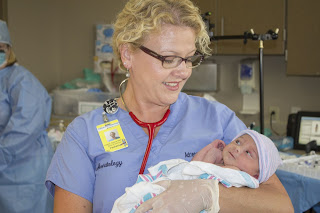 |
| Nursing Careers |
WATERLOO — An acute case of demand overwhelming supply has
put nursing on the critical list.
Experts say there is a serious shortage of nurses, and things
are only going to worsen as the baby boom generation retires.
“I don’t even want to think about that,” said Kelly Richards,
chief nursing officer for the Wheaton Franciscan Healthcare-Iowa, which
includes Covenant Medical Center in Waterloo, Sartori Memorial Hospital in
Cedar Falls and Mercy Hospital of Franciscan Sisters in Oelwein.
The shortage cuts a wide swath across the nursing category,
embracing acute- and emergency-care, home health, rehabilitation and other
areas.
“There’s a statewide shortage of registered nurses,” said Dr.
Jerry Durham, chancellor at Allen College in Waterloo, the largest nursing
school in Northeast Iowa. “In the Cedar Valley, which I know more about, there
are significant numbers of openings for nurses at all three hospitals.”
Some areas of Iowa are worse off than the Cedar Valley, but
the shortage stretches across the state, Richards said.
“I’ve talked with different colleagues in central Iowa, and
they were really feeling the shortage,” Richards said. “They stressed that they
had open positions and had a hard time filling them.”
Locally, there’s a “little bit of a shortage,” but recruiters
have been active, Richards said.
“Specifically, critical-access hospitals that aren’t
affiliated with larger organizations may have had shortages,” Richards said.
“One said they’ve had one position open for a year. It doesn’t seem like a lot,
but for a small critical-access, 25-beds or fewer, that’s a lot.”
The shortage probably is most acute in the medical-surgical
area, Richards said. Many nurses start in that area but later gravitate toward
other areas.
“At Wheaton, the specialty areas currently don’t have many
openings — some don’t have any — because the nurse develops an interest in that
area,” Richards said. She mentioned the birth center, emergency rooms and
operating rooms in particular.
Help wanted
Both Wheaton and UnityPoint Health recently held job fairs
for nurses, and additional fairs are upcoming. Wheaton drew more than 50
candidates to a recent job fair, Richards said.
“We hired about a third of them,” she said. “We try to fit
the candidate to their area of interest.”
Some not hired were qualified but interested in areas with no
openings — the Family Birth Center, for instance. Shift preferences can also be
a factor, Richards noted.
UnityPoint Health-Allen Hospital in Waterloo, on whose campus
Allen College operates, benefits from its proximity to the nursing school,
Durham said.
The shortage hits close to home, said Jan Erpelding, manager
of clinical recruitment at UnityPoint-Allen Hospital.
“The most intense it’s been has been within the last 10
months,” she said.
Allen has 65 RN openings. The clinics have 11 RNs and 11 LPNs
open. Home health has nine vacancies. The hospital will hire some of Allen
College’s 50 December graduates, Durham said.
“They’re not all going to work at Allen; our graduates go
everywhere,” Durham said.
Most new nursing graduates want to work in a hospital
setting, but only about 50 to 55 percent of the nursing workforce in the U.S.
actually does, Durham said.
“It has decreased over the years as job opportunities have
increased in other settings,” he said.
100 percent placement
Job opportunities locally abound for nursing school graduates
of all stripes.
“Any registered nurse, without or with experience, can find a
job in the Waterloo area,” Durham said.
Hospitals prefer experienced nurses or nurses with a
four-year nursing degree.
“However, I know employers are hiring brand-new nurses with
two-year degrees from the community college,” Durham said.
 |
| Nurse Requirements Have risen |
Allen College is looking outside standard classroom venues to
bring in more students, Durham said, considering online study. “We are moving
in that direction for one of our accelerated programs,” Durham said.
Allen College’s enrollment for the semester that ended in
December was 611 students — more than twice that of 10 years ago. The growth is
the result of a number of initiatives.
In addition to offering more programs online, Allen has
arrangements with several higher-education institutions, including the
University of Northern Iowa, Wartburg College, Loras College, Simpson College
and Central College. Students can go to affiliate institutions for three years
and finish a BSN at Allen in 15 months, Erpelding said.
Ten years ago, there were 35 students in graduate programs at
Allen College; today, there are 240 in master’s and doctoral sequences, Durham
said.
Two-year nursing graduates from Hawkeye Community College in
Waterloo also can move on to Allen College for further credit, Erpelding said.
The college has master’s programs in nursing and occupational
therapy and doctoral programs in nursing practice (DNP) and education in health
sciences. The masters program has a total of seven options, including four
nurse practitioner offerings, Durham said.
The accelerated program in nursing, which now enrolls 64
students, was introduced in the last decade. Allen College launched a master’s
in occupational therapy last fall and anticipates admitting 24 students per
year. A doctor of physical therapy program will eventually be added, Durham
said.
Undergraduate students are obtaining a four-year degree
graduate with an average debt load of about $29,000, about the same as the
national average. But the virtual certainty of landing employment can take some
of that sting away, Durham said.
Erpelding said there are financial incentives available to
recruits, including a $10,000 signing bonus that commits a nurse to the
facility for three years. She said Allen Hospital also offers a “very good support
system, as far as forgivable student loans.”
Wheaton Franciscan also offers tuition reimbursement and loan
forgiveness, Richards said.
There’s also a nurse residency program.
“Within three months of hire, they get in and talk about a
variety of topics, such as their professional journey as a nurse, legal issues,
stress, prioritization,” she said. “It’s kind of a nice area for the new hires
to talk. Our orientation, when we hire a new nurse, it’s pretty comprehensive.
It includes some classroom education and some hands-on training and time in our
simulation lab.”
Nurses with at least one year of experience also can
participate in a career ladder program, Richards said.
Shortage to grow
The need for nurses is only going to increase, Durham said.
The nation is going to need 1 million new nurses in the next decade, according
to federally supported studies, due to retirements, an aging population and
more access to health care through the Affordable Care Act.
A goal nationally is to fill 80 percent of those jobs with
registered nurses who have four-year degrees, Durham said.
“Some employers are compelling them to do it and also
providing financial support for them to return to school,” he said.






































